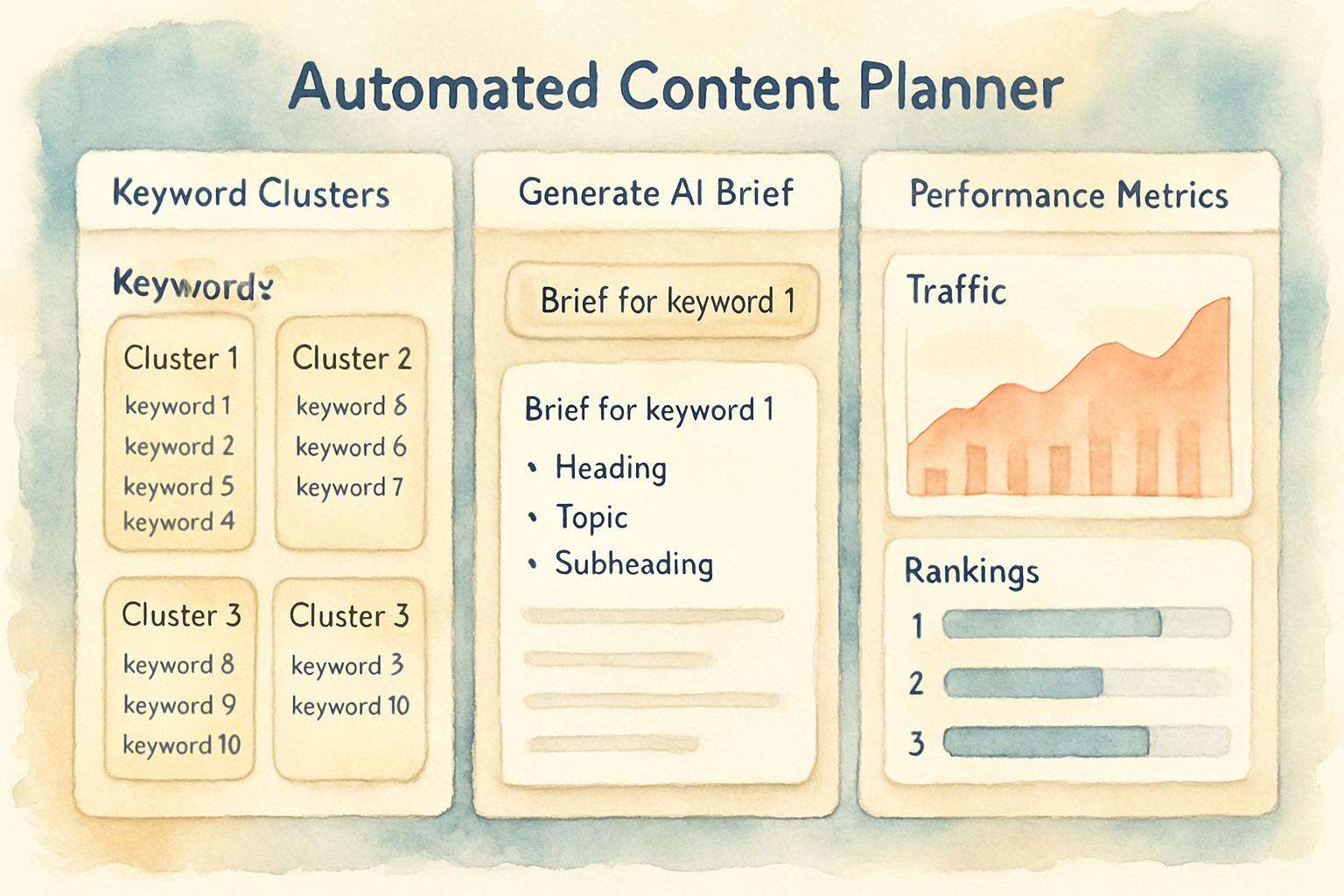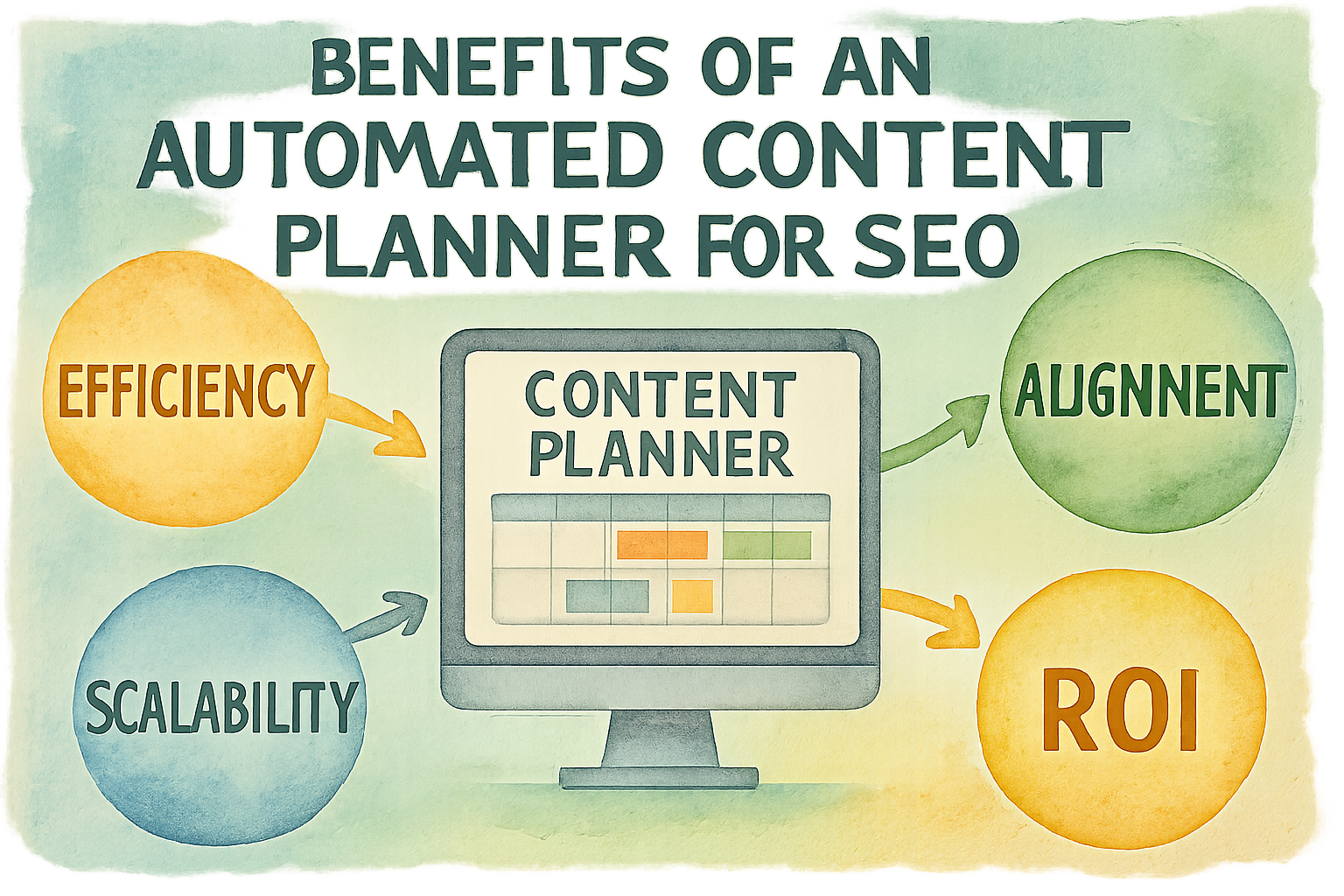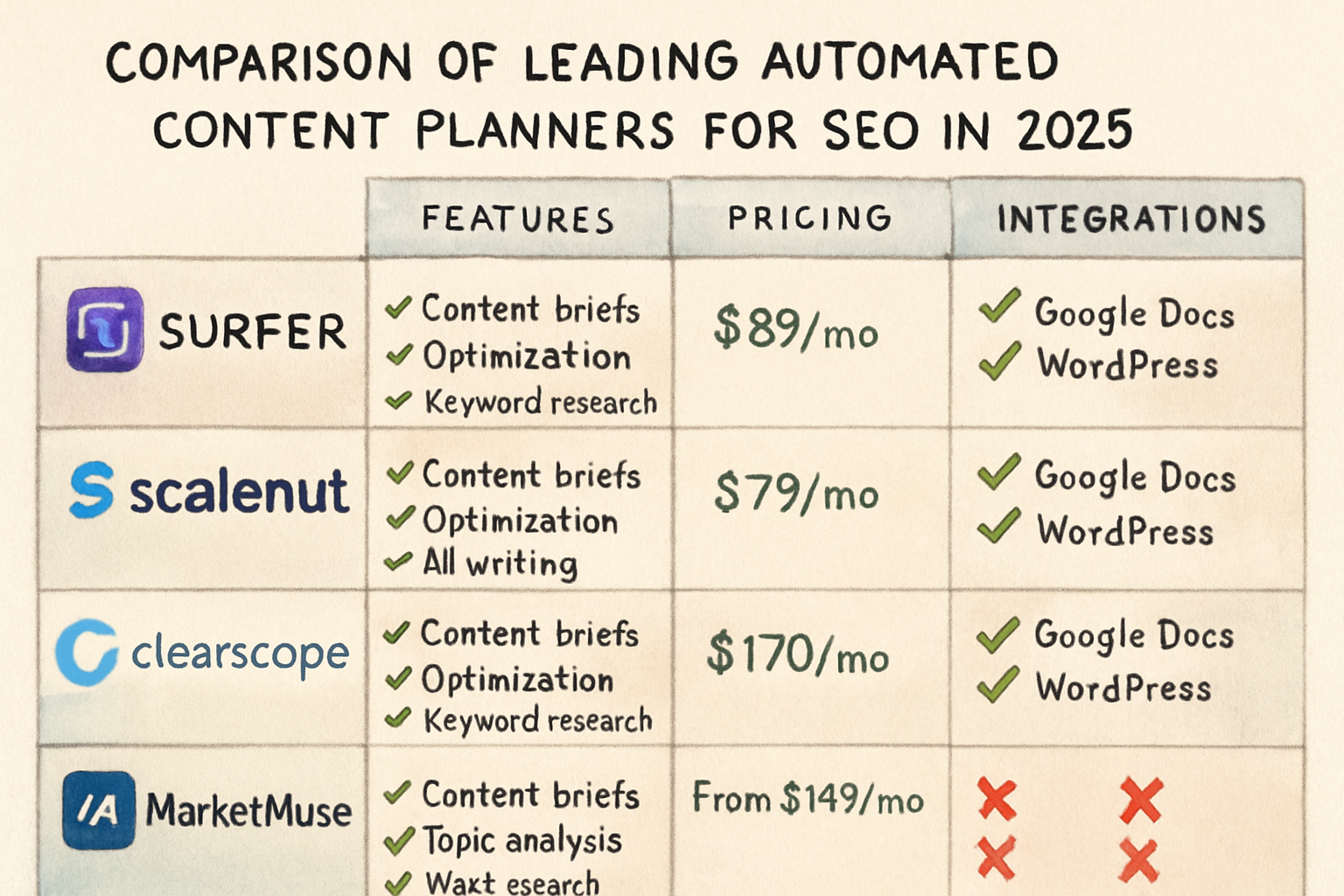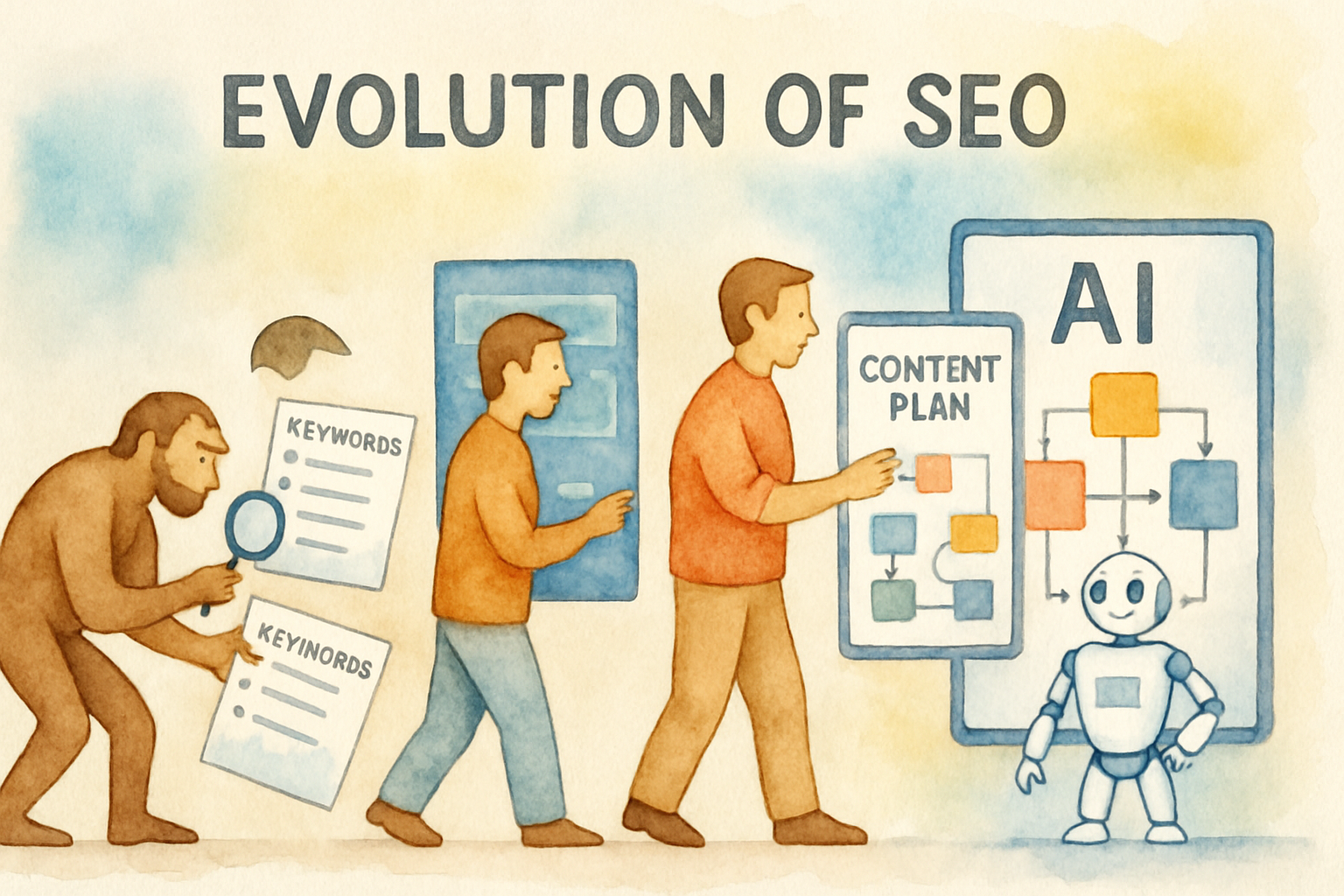Everyone knows that planning SEO content manually is time-consuming and often inefficient.
But what exactly is an automated content planner for SEO?
Here’s a complete guide to help you understand how to leverage automation for smarter SEO content planning.
Some are designed to combine competitive analysis with real-time keyword insights.
Some are powered by AI that generates detailed briefs to guide content creators.
Some seamlessly integrate SEO, accessibility, and analytics into one smooth workflow.
Some can automate audits, surface topic clusters, and track content performance on autopilot.
Some empower marketing and SEO teams to collaborate effortlessly and prove ROI like never before.
Let's dive right in.
What Is an Automated Content Planner for SEO and Why Does It Matter?
At its core, an automated content planner for SEO is a platform or tool that uses AI and data-driven insights to plan, optimize, and manage your content strategy efficiently. Unlike traditional methods based on guesswork, these planners help marketers build a predictable content engine guided by real-time analytics and competitive research.
The importance of such platforms has skyrocketed because marketing teams face immense pressure to produce more content — fast. Without clear guidance, their efforts often lead to scattered, low-impact posts that don’t build authority or drive meaningful traffic. Aligning SEO specialists with content creators becomes a challenge, and proving content ROI feels impossible.
Leading platforms like Siteimprove unify accessibility, SEO, analytics, and strategy into a continuous flow, enabling you to create high-performing content that’s both human- and AI-friendly. This holistic approach moves your content program from chaos to clarity, making strategy execution seamless.
Imagine automating your content audits, instantly spotting valuable topic clusters, and generating AI-powered briefs with outlines and SEO guidelines—all at scale. Your writers receive clear, prioritized instructions, and your SEO team sees the direct link between content and ranking improvements. This creates alignment and accelerates performance growth.
(Verified with sources as of 2025-09-03)

How Does an Automated Content Planner for SEO Work?
These advanced content planners function by integrating several key components into one platform:
- Competitive and keyword research: Automated scanning of competitors’ websites and SEO performance to uncover content gaps and keyword opportunities.
- Audience demand analysis: Using real audience data to identify trending topics and clusters with the highest potential impact.
- AI-powered brief generation: Creating detailed content briefs containing outlines, internal link suggestions, and persona-specific guidance to streamline content creation.
- Content optimization tools: Real-time SEO recommendations during writing to ensure every article meets ranking criteria before publication.
- Accessibility and compliance checks: Ensuring content is inclusive and meets legal requirements, integrated seamlessly into the workflow.
- Performance tracking and analytics: Continuous monitoring of content effectiveness with prioritized fixes and improvements.
By bringing all these elements together, an automated content planner reduces inefficiencies, cuts down on manual work, and frees teams to focus on strategic initiatives.
For example, a marketing director using Siteimprove.ai reported cutting down time spent fixing issues by more than 50%, boosting workflow efficiency and positively impacting revenue. Tools like these don’t just save time; they transform content creation into a scalable growth engine source.
What Are the Benefits of Using an Automated Content Planner for SEO?
Adopting an automated content planner delivers massive advantages over conventional SEO planning methods. Here’s why it’s worth the investment:
1. Data-Driven Strategy Instead of Guesswork
Rather than rely on gut feelings or disconnected spreadsheets, you harness real-time insights. The platform identifies content clusters where you can outperform competitors based on actual search demand and performance gaps. This focused approach builds topical authority systematically.
2. Alignment Between SEO and Content Teams
An automated system bridges the long-standing gap between SEO specialists and writers by generating AI-derived content briefs that precisely capture keyword intent, internal linking strategies, and target personas. Fewer revisions, clearer targets, and higher quality output result.
3. Scalability Without Headcount Explosion
Scaling content programs traditionally means hiring more people. Automation reduces manual research and brief creation time drastically, allowing your existing team to produce many more high-value assets without burnout.
4. Continuous Optimization and Compliance
Some platforms include automated accessibility checks and compliance validations as you create, ensuring every piece meets legal standards and reaches broader audiences. This inclusivity enhances brand reputation and search rankings.
5. Proven ROI and Predictable Growth
When content is strategically aligned with search intent and continuously refined using performance data, organic traffic growth becomes predictable. Marketers can prove value and justify budgets with confidence.
6. Integrated Workflow and Reduced Tool Sprawl
Many businesses suffer from toggling between SEO, content planning, and analytics tools. Leading automated planners unify these functions, providing a single source of truth for all stakeholders source.

How Can Automated Content Planners Enhance Your SEO Strategy Today?
It's no secret SEO is rapidly evolving in 2025. Search engines and AI-driven tools like Google AI overviews and ChatGPT are reshaping how users find information online. Having an automated content planner is not just useful—it's essential to keep pace.
Here’s how these systems empower you to future-proof your SEO:
Keep Pace With Generative Engine Optimization (GEO)
GEO is the cutting-edge SEO trend where content is optimized to get featured by generative AI tools that often dictate top-of-funnel traffic. These AI overviews rely on trustworthy, well-structured web content. Automated planners help you build content that aligns perfectly with what these AI tools prefer, increasing chances of being recommended source.
Create Specific, Long-Tail Content That Resonates
AI tools encourage longer, more specific search queries. With automated planners, you can identify precise topics and subtopics your audience is searching for, so your content closely matches those queries. This strategy wins both traditional SERP rankings and AI overview placements.
Align Content With User Intent and Experience Signals
Modern SEO demands demonstrating Expertise, Authoritativeness, and Trustworthiness (E-A-T). Quality content endorsed by real experts and featuring firsthand experience performs better. Automated planners guide your content to satisfy these criteria while managing tone, voice, and compliance seamlessly. This approach helps you stay competitive as Google and AI reward nuanced, trustworthy content source.
Boost Collaboration Across Teams
Cross-functional collaboration is streamlined as SEO analysts, content creators, and accessibility teams operate on one platform. Shared dashboards and AI-powered briefs provide transparent progress tracking and enable faster course correction.
Automate SEO Audits and Track Performance
The automated content planner continuously scans your website to detect SEO gaps, accessibility issues, and content decay. It proactively suggests fixes backed by priority rankings, reducing manual audit time and raising your site’s standards over time source.
Are you ready to discover how automation can unlock your SEO content potential?
Best Tools for Automated Content Planning in 2025
Selecting the right automated content planner means balancing features, integrations, AI capabilities, and cost. Here’s a look at some notable players shaping SEO content planning:
- Siteimprove.ai: An all-encompassing platform combining SEO, accessibility, analytics, and content strategy into one continuous flow. Its AI agents automate audits, content briefs, and competitive research tailored to your market Learn more.
- Scalenut: This AI-powered SEO and content marketing platform covers research, planning, creation, and optimization with a data-driven foundation.
- Frase: Focused on matching content with user intent, Frase helps you optimize your articles in real time based on AI insights.
- MarketMuse: Known for AI-driven content planning and optimization, it supports strategic topic clustering and detailed brief generation.
- StoryChief: An all-in-one content marketing platform aimed to streamline content creation, optimization, and distribution across channels Read more.
Choosing your platform should match your team's size, budget, and workflow. The best results come from tools that enhance existing processes rather than forcing disruptive changes.

How to Implement an Automated Content Planner Effectively
Getting started with an automated content planner goes beyond simply activating the software. Follow these steps for maximum impact:
1. Define Your SEO Goals Clearly
Start by clarifying what you want your content strategy to achieve—whether it’s increasing organic traffic, boosting conversions, or building authority in a niche.
2. Audit Existing Content
Use the automated auditor to evaluate your current content landscape. Identify powerful assets to update and low-performing pages to improve or retire.
3. Align Teams Around the Platform
Bring SEO, content, accessibility, and compliance teams onto the same system. Share training sessions to ensure everyone understands how to leverage AI-powered briefs and dashboards.
4. Integrate With Your CMS and Workflow
Connect your automated planner to your content management system and project management tools for seamless publishing and collaboration.
5. Prioritize Content Opportunities
Leverage AI-driven prioritization indicators like traffic potential and “quick wins” to focus resources on high-impact topics first.
6. Monitor Performance and Adjust
Regularly review content performance analytics and use automated recommendations to refine your strategy continuously.
Keep the reader’s intent and experience front and center. Automated planners can provide the guidance, but the human touch in content creation remains critical.
What Challenges Can You Expect with Automated Content Planning?
While the benefits are substantial, be mindful of these common pitfalls:
- Some platforms have steep learning curves; invest time in initial training to avoid misuse and suboptimal results.
- Overreliance on AI without human oversight may result in repetitive or generic content—always inject originality.
- Integration with legacy systems may require technical effort; choose solutions with robust APIs and support.
- Content strategies must evolve with search engines. Automated planners provide snapshots but require continuous human strategic input.
Many early adopters find that blending automation with human expertise produces the most sustainable SEO success.
How Will AI Change the Future of SEO Content Planning?
AI is revolutionising how SEO content is planned, created, and optimized. Tools will increasingly provide:
- Deeper insights into search intent and audience behavior based on massive datasets
- Adaptive content briefs that update in real time as competitive landscapes shift
- Automated multi-channel content distribution to boost exposure efficiently
- Predictive analytics telling you exactly which topics to focus on next
- Voice and visual search optimization built in from the start to capture emerging traffic sources
Embracing AI-enabled automation today prepares you to capitalize on these future advancements, staying ahead in a highly competitive SEO world.
Can You Prove the Impact of Using an Automated Content Planner?
Yes. Many companies report measurable improvements in both efficiency and performance after switching to automation.
A Siteimprove customer saw time spent on routine SEO fixes drop by over 50% which freed marketing teams to scale content programs effectively. On the performance side, focusing on data-backed topic clusters translated to marked organic traffic gains and enhanced topical authority.
Rather than managing random requests, teams can now execute strategic plans with proof points backed by integrated analytics dashboards.
What Is the Role of Human Expertise in Automated SEO Content Planning?
An automated content planner is a powerful assistant, not a complete replacement for human skills. AI excels at crunching data, automating audits, and offering recommendations. But it needs a human operator to:
- Set the overall strategy and define quality standards
- Interpret nuanced audience needs and user intent
- Guide AI tools with domain expertise to craft meaningful content
- Validate AI-generated content for accuracy, tone, and brand voice
- Inject creativity, storytelling, and emotional connection
- Continuously monitor trends and adjust strategic priorities
SEO experts who embrace AI as a collaborative tool rather than a threat unlock the most value. Training and experience remain essential to harness the full potential of automation source.
What Are the Best Practices for Automated SEO Content Planning?
To maximize ROI and impact, implement these proven tactics:
Regularly Update Your Content Plan With Fresh Data
Automated tools provide ongoing insights—don’t let your plan stagnate. Continually revisit topic clusters and keyword opportunities as search trends evolve.
Focus on User-Centered Content Creation
Understand your audience’s search intent deeply. Create content that genuinely addresses their questions and pain points, beyond just keyword stuffing.
Integrate Accessibility and Compliance From the Start
Make your content inclusive and legally compliant. This improves user experience and expands reach.
Ensure Consistency in Brand Voice Across All Content
Automate brand guidelines enforcement during content creation to maintain trust and professionalism.
Leverage AI to Generate Custom Briefs, Not Full Articles
Use AI to assist writers by providing research and outlines, but maintain human editing to ensure originality and quality.
Embed Multimedia and Interactive Elements
Videos, infographics, and interactive checklists increase engagement and time on page, boosting SEO indirectly.
Track Performance and Pivot Quickly
Use automated analytics to detect what content works and what doesn’t. Use insights to refine your strategy continually.
As this video explains, AI is changing SEO fundamentally, including how content is planned and discovered. Automated content planners help you adapt to these changes, ensuring your business is found both in traditional search and AI-powered generative engines.
How will you adapt your SEO in this fast-changing landscape?

Frequently Asked Questions About Automated Content Planners for SEO
- What is the primary function of an automated content planner for SEO?
- It uses AI and data analytics to streamline and enhance content research, planning, brief creation, optimization, and performance tracking.
- Can automation replace human content creators?
- No. Automation assists with data gathering and brief generation, but human insight is vital to ensure content quality, originality, and relevance.
- Will an automated content planner improve organic traffic?
- When used strategically, yes. By targeting topics with real audience demand and optimizing content for SEO and accessibility, it can boost rankings and traffic.
- How does automation help with SEO audits?
- It continuously scans content and technical elements to identify and prioritize fixes, saving time compared to manual audits.
- Are automated content planners expensive?
- Costs vary widely. Some platforms offer scalable pricing. Considering the time savings and performance gains, many find the ROI justifies the expense.
What's Your Next Step?
Tell us in the comments: How will you apply this to your SEO content planning? For personalized advice, check out our detailed guide on automating SEO content creation and discover top AI SEO software for agencies to elevate your strategy today!
Also, learn from experts in SEO pricing and agency selection in our resource SEO Prices UK 2025: The Ultimate Guide.
Implementing an automated content planner for SEO can turn your content marketing into a well-oiled, strategic machine—capable of delivering predictable results.